Blackfish is winning the battle in the west – now there’s a new war in Asia
11 February 2016
By Dave Neale, Animal Welfare Director , Animals Asia
It’s worth remembering that money is behind most animal cruelty – it’s business and business is always looking for new markets.
Standing on the shoulders of animal welfare giants, the movie Blackfish was the beginning of the end for western animal performance using dolphins and killer whales.
As the number of people in Europe and America willing to pay to see this cruelty diminishes – and with the likes of SeaWorld on the run – it’s worth remembering that they too are customers. When SeaWorld stopped expanding, its cruel suppliers started look elsewhere. They looked east.
In recent years we have noted an increasing public demand for seeing whales and dolphins in captivity within Asia. This demand is fuelled by an industry which sees profit in animal suffering, ripping animals from their families and their natural environment, to incarcerate them in tiny pools and make them perform tricks for their food.
The rise in the use of whales and dolphins in entertainment within countries such as China, Indonesia and Vietnam is incredibly worrying at a time when an end to this horrific cruelty might otherwise be in sight. This is an industry that has had a foothold in the USA, Europe and Australia for many years, and many thousands of individual animals have suffered, and continue to suffer in the name of entertainment.
It’s distasteful to imagine that those people behind this cruelty are cynical enough to look at the world and spot opportunities to continue this horror trade. What they want are areas with little awareness of animal welfare and porous legislative controls that do little to protect captive animals from suffering.
In Indonesia, wild caught dolphins are subjected to frequent transport and lives in tiny pools as part of travelling dolphin shows. We can only imagine the stress such transport and time spent immobilised must cause for these individuals.
In Vietnam, wild caught dolphins are subjected to poor living conditions and the indignity of being forced to jump through hoops of fire to entertain a public largely unaware of the stress and suffering such conditions cause.
In China, over 400 wild caught whales and dolphins now languish in the countries ocean parks, with many more ocean parks under construction, fuelling an ever-increasing demand for more wild caught animals. In January 2016, one such facility opened within a shopping mall in the southern Chinese city of Guangzhou. Encouraging shoppers to stop by and view animals such as wild caught beluga whales stereotypically swimming within their tiny pool. This epitomises the attitude of the industry, using animals as commodities to be used, abused and eventually discarded and replaced when they fall ill and die.
The rise in the ocean park industry in China has fuelled a huge demand for more wild capture within Russia and Japan. Over 200 dolphins, pilot whales and false-killer whales ripped from their ocean homes in Japan, and over 100 beluga whales and at least nine killer whales all being forcibly removed from their families to meet this insatiable appetite for bigger attractions within China.
The finger of blame for this cruelty must be pointed directly at those that are responsible for the wild capture, purchase, and eventual incarceration of these animals. With little or no regard for the fact that these individuals live within complex family groups, within societies built upon cooperation between individuals, empathy for fellow family members and moral behaviours which ensure group harmony and cohesion.
It is these messages of the emotional and cognitive capacities of these intelligent, socially complex animals that we are promoting across Asia in the hope that a largely uninformed public will one day turn their own backs on this industry and help to set free those individuals that continue to suffer in the name of entertainment and prevent further individuals from suffering the same fate.
Take action:
1. Pledge never to watch animal performance
2. Sign our petition to close Grand View Aquarium
3. Donate to our work to end animal cruelty
4. Share this story
BACK








 Freedom after two decades: Moon bears Nang and Mua rescued
Freedom after two decades: Moon bears Nang and Mua rescued
 With heavy hearts we say goodbye to our beloved Tulip
With heavy hearts we say goodbye to our beloved Tulip
 Three moon bears rescued from notorious bear bile farming hotspots in Vietnam
Three moon bears rescued from notorious bear bile farming hotspots in Vietnam